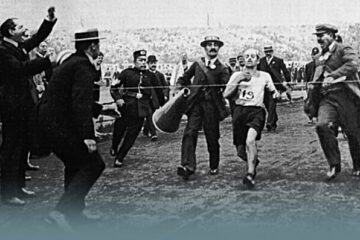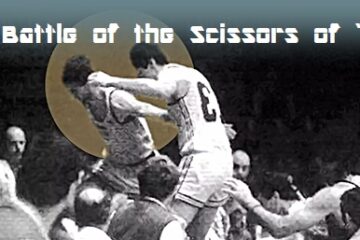The Penalty that lasted a Weeklong | The Incredible Stories of Football!
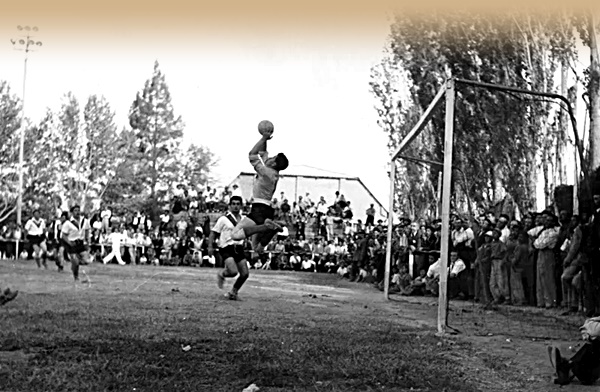
Penalty! Penalty! Penalty!
Right or wrong, good or bad, the penalty kick is perhaps the only moment, in the context of team sports, in which the challenge is reduced to a duel between two individuals, and which no longer takes into account in the slightest everything that happened in a match that lasted one hundred and twenty minutes.
It doesn’t matter who played better, who had more chances or, simply, who is stronger, because at that point everything is reset, and only the nerves remain; the nerves of the one who shoots and the one who saves.
This is an incredible story written by Argentine sportswriter Osvaldo Soriano
First part
I have seen the most fantastic penalty in the history of football. It was taken in 1958, in Patagonia, Argentina. On a Sunday afternoon in an empty stadium, during the match “Cipolletti” – “Estrella Polar”.
“Estrella Polar” was a club where they played cards, billiards. A drunkards’ den on a dirt road in the Rio Negro Valley. Estrella Polar was a football team that participated in the Della Valle amateur championship …
Sometimes on Sunday there was nothing to do.
The players were always the same or the brothers of the same ones. I remember that when I was 15 and they were 30 they seemed very old to me. The “il gatto” Dias, their goalkeeper, was almost 40, and had long white hair that fell on his Indian forehead. In the Valley championship, 16 teams participated. And “Estrella Polar” always placed between 13th and 14th place.
But in 1958, when Estrella started the championship, winning four games in a row and they will jump to the top of the tournament, relegating the “Cipolletti” the eternal champion, to second place one point behind.
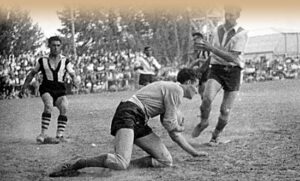
In the countries of Della Valle, they began to talk about them. When at the end of the first round, at home they lost the lead because, because the “Cipolletti” has scored in their gate 7 times, everyone thought that normality was returning. But the following Sunday they will start winning again for the 1-0, they will continue, their litany of tiring, horrible triumphs, arriving in spring with only one point less than Cipolletti, who was in first place in the standings.
The last clash was a historic event, because of that legendary penalty kick. The stadium of the “Cipolletti” was full. The roofs of the houses were even close. I was a kid who had to climb a tree to see that game. The referee who called the penalty was called Herminio Silva. He was an epileptic who sold lottery tickets in the local club.
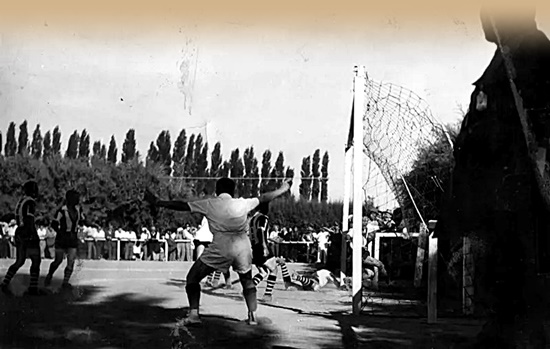
In the 40th minute of the second half, with the score still tied at 1-1, we all understood that Herminio Silva was risking his job, because despite the Cipolletti’s attackers, the home team, throwing like fish in the opponent’s area to impress him, he, Herminio Silva had not yet awarded the maximum punishment.
But in the 42nd minute, the Estrella players will all be speechless. They will executed a free kick from far away and take a 2-1 lead, and then Herminio Silva will think about his job and prolong the game, until the right wing of the home team, the great Patin, the barber, enters the area and even though no opposing defender comes near him, Herminio Silva whistles and points to the eleven meters.
Penalty?!
Oh yeah! For Herminio Silva it`s a penalty!!!
He doesn’t even manage to pick up the ball, because the Estrella right back, Rivero, called “er ciolo”, knocks him down with a punch in the face!!!
Outbreak a fight so long that night fell and there was no way to wake the unconscious referee, nor to clear the field.
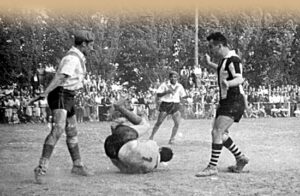
And the control commission, the next day, established that there were still twenty seconds to play from the execution of that penalty kick. And that private match between the standing Rodriguez, the “Cipolletti” scorer and “el gatto” Diaz, the “Estrella” goalkeeper would take place the following Sunday, in the same stadium behind closed doors.
So that penalty would last a week. And it is that sand, the longest penalty in the entire history of football.
* * *
Monday at the club, the “gatto” spent the whole evening without saying a word, until he stuck a toothpick in his mouth and said:
– Constante shoots them all to the right side!
– Yes!
– But, he knows that I know …..
– So we’re screwed!
– Yes, but I also know that he knows.
– So throw yourself to the left and it’s done!
– No! Because he knows that I know, that he knows!
The “gatto” is getting stranger every day.
On Tuesday, the “gatto” didn’t show up for practice, nor on Wednesday.
On Thursday, when people met him while he was walking on the train tracks, he was talking to a dog with a docked tail.
People asked him:
– Hey, “cat” will you save the penalty? And he replied:
– I don’t know! And what would it change.
– That will be our consecration…..
– I will have my consecration, when the blonde from Ferreira decides to love me.
“Er gatto” is getting stranger every day…
Friday, the blonde from Ferreira was as usual taking care of the haberdashery, when a boy came in with a bouquet of flowers and a smile as big as an open coconut.
– Blonde, hey blonde!
– Dime amor!
– These are sent to you by the “gatto” Diaz, but until Monday you have to say that he is your boyfriend.
– Poor boy!
Saturday afternoon “the cat / gatto” borrowed two bicycles and together he and the blonde from Ferreira went to the river bank.
When it started to get dark “the cat” wants to kiss her.
– No! Maybe Sunday night at the dance ballroom and when you will only save the penalty!
– And how do I know?
– How do you know what?
– If I have to throw myself that way?
– In this life you never know who is deceiving who
– And if I don’t save it? – So it means you don’t love me – The blonde is weird too!
* * *
On the Sunday of the penalty kick at three in the afternoon, the two teams showed up on the field in full game gear, as if they were playing a real match. When everyone was gathered in the center of the field, Herminio Silva went straight to “the ciolo” Rivero, the one who had punched him the previous Sunday, and sent him off the field showing him a red card.
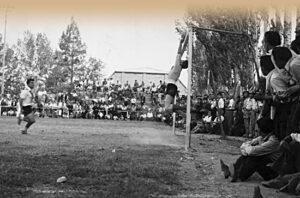
Then he went to the goal. He counted twelve steps and put the ball on the ground. And “the cat” had combed his hair with brilliantine. His head shone like an aluminum pan.
At three thirty sharp, Costante Rodriguez went to clear the ball. In his imagination, he had taken that penalty many times. He later said that he would have taken it again like that at any moment in his life, asleep or awake.
At a quarter to four, Herminio Silva put the whistle to his lips, and blew with all his strength.
But he was so nervous, and the sun had beaten down so hard on his neck that when the ball went off toward the goal of the “cat” Diaz, Herminio Silva felt his eyes roll back, falling from behind, and foaming at the mouth.
“The cat” took a step forward and threw himself to the right. The ball advanced, spinning on itself, towards the center of the goal, and Costante Rodriguez immediately sensed that the legs of the “cat” would arrive just right to deflect it into a corner.
And the “gatto” thought of the dance that evening, of the late joy, of the sumptuous body of Ferreira’s blonde. He stretched out and parried the ball, when the entire “Estrella” threw themselves on the “gatto” Diaz to celebrate him.
A linesman entered the field with his flag raised, shouting:
Null! Null! It doesn’t count!
The referee, Herminio Silva, woke up only five minutes later, still reeling from the epileptic fit.
– What happened? What happened? He asked!
And when they told him, he shook his head and said that the penalty had to be taken again, because he hadn’t seen it, and the rules say that a game can’t be played with a referee unconscious!
Then the “cat” chased away all those who wanted to beat up the lottery ticket seller (the referee Silva). He said that they had to hurry, because he had a date that night.
It`s a promise! And he went back to the goal again! Costante Rodriguez went to reset the ball, while a linesman helped Herminio Silva to stay on his feet. The shot started on the left and “the cat” threw himself in the same direction, with an elegance, and a confidence, that he would never showed it again.
We jumped down from the wall, and ran to see Diaz up close, the old, the big one, who was looking at the ball he was holding in his hands, as if he had drawn the winning number of the lottery.
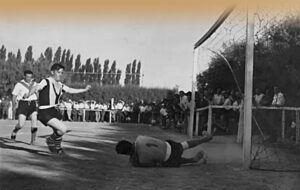
A few years later, when he was a wreck and an insolent young man, I found him twelve paces away, and you see him immense, curled up on tiptoe, with the fingers of his hands open, long.
He wore a wedding ring on one finger, which was not that of the blonde from Ferreira, but that of the sister of the “er ciolo” Rivero, Indian women and old like him. I avoided looking him in the eyes and decided to hit low, knowing that he wouldn’t get there because he was a bit fat by now, the glory was starting to weigh on him.
When he ran to get the ball from the back of the net, he was getting up like a tired dog. He looked at me and said:
– See, boy? In life we are all goalkeepers. You never know where they’re going to save the penalty.
– Boy! Well done! One day you’ll go around here, telling people that you scored a goal against the “cat” Diaz, but no one will believe you!!
* * *
The referee blew the final whistle, I rushed down the stands as if I were flying, flying, flying. I had my arms squared up like a child making an airplane, and while I was actually flying over the field and the stadium, it seemed to me that the stands, the bleachers, the players, everyone began to fly with me as if I were the Archangel Gabriel himself!
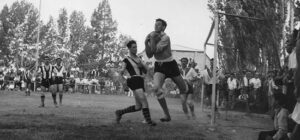
(A play taken from the show theatre “Gol! Tacalabala! Il racconto del Calcio” (2000) with the excellent interpretation of the three actors Gianpiero Bianchi, Marco Cavicchioli and Giuseppe Cederna! Based on the book by the famous sports writer, Osvaldo Soriano)
Second Part
A writer in love with football like Osvaldo Soriano could never have failed to exploit a situation so full of drama and tension to write a story; and in fact his story “The Longest Penalty in the World” dates back to 1995 and is included in the collection “Thinking with your Feet”.
Considered one of the most beautiful stories ever written about football, Soriano actually uses the emotional force of a penalty kick as a pivot around which to revolve the memories of his adolescence when, together with friends and people from the village, he went to watch the local team’s matches.
It’s the 1950s of the clay courts, and the clubbers who drink and play cards are the same ones who then go to the field on Sundays to play the championship of the small Argentine region of the Rio Negro Valley.
The stands are half empty and if they fill up it’s usually to mock those players who are too bad and lazy; they are the battered stadiums of all the suburbs of the world, where on Sundays that are too cold or too hot there is nothing to do but go and support your own football team.
Soriano tells the story firsthand of that 1958 championship, when the team he supports, usually shabby and always in the last positions, finds an incredible series of victories that year, all ugly, stretched and lucky, but that one Sunday after another bring his Estrella Polar to just one point from the first in the standings, “Deportivo” Belgrano, (Cipolletti) objectively stronger and always the favorite and that for years has monopolized the top of the standings.
They had become the attraction of the country and everything was allowed to them. The old men would pick them up in the bars when they drank too much and started to pick fights; the shopkeepers would give them a few toys and sweets for the children and at the cinema the girls would accept caresses above their knees.
And so it comes to the last day, in the direct clash between David and Goliath. Deportivo plays at home and a draw is enough to be champion, but Estrella unexpectedly takes the lead (1-2) and at that point, poor Herminio Silva, a referee who lives and works for the local club, invents a penalty at the last minute to save not only his job and himself, but also the home team.
A fixed match, obviously, and, as in every self-respecting suburban field, a gigantic brawl breaks out involving fans and players, and it lasts so long that the match is forced to be suspended, also because Silva is knocked out, hit by a punch from someone from Estrella.
The commissioners’ decision is that the game will be concluded the following week, playing only those final twenty seconds starting from the penalty.
Here it is, the longest penalty in the world, a week of waiting during which the protagonist is “el Gato” Diaz, the almost forty-year-old goalkeeper of Estrella Polar, who in those days becomes the point of reference and the hope to which the whole country clings.
In the meantime, he trains and has penalties kicked by anyone. People seek him out, encourage him, treat him like an oracle, asking him where the opponent will shoot and if he will be able to save it. Although most of the memories related to matches decided by penalties concern who kicked it rather than who should have saved it, it is good to remember that, as in Soriano’s story, reality also saw goalkeepers as the main protagonists.
In this regard, it is interesting to report an anecdote told by the journalist Simon Kuper, who in his book “Calcionomia” quotes a dialogue taken from The Longest Penalty in the World:
Dìaz remained silent all evening, throwing back his hard white hair until after eating he stuck the toothpick in his mouth and said:
– Constante shoots them to the right.
– Always, – said the team president.
– But he knows that I know.
– Then we are screwed.
– Yes, but I know that he knows, – said el Gato.
– Then immediately throw yourself to the left, – said one of those who were sitting at the table.
– No. He knows that I know that he knows, – said el Gato Dìaz and got up to go to sleep …
This passage, says Kuper, and if you have ever tried to kick a penalty you will realize how universal this exchange of words is, perfectly represents the game theory applied to football. Some economists who are passionate about football have in fact applied this theory over time to the study of penalties, to understand at the right moment how and where to kick them.
In 2008, for example, Ignacio Palacios-Huerta, an economics student passionate about the study of penalties, after having collected an impressive amount of material and processed a lot of data, sent his studies, through a mathematician friend, to the Chelsea team, shortly before the Champions League final that they were going to play against Manchester United. Ironically, that match ended in penalties.
Huerta’s study indicated exactly where each player should kick, that is, always and consistently to the left of the goalkeeper, his weak side. All Chelsea players follow this, scoring.
After six penalties, Van der Saar, the Manchester United goalkeeper, realizes that this is a precise strategy so, when it is Anelka’s turn for Chelsea, Van der Saar stands in goal and with his finger begins to indicate the corner where he should kick according to the strategy, as if to say:
I understand, that’s where you have to shoot, right?
With that trivial gesture, the Dutch goalkeeper had taken psychological control of the situation. That is in fact the precise moment in which poor Anelka mentally collapses, and in his head appears exactly the dialogue written by Soriano. He decides not to respect the strategy and misses. It was the decisive shot, and the cup flew to Manchester. The penalty as the fulcrum of a match is not a random choice, it is rather a perfectly functional moment from a narrative and dramaturgical point of view.
That week of waiting is nothing but the height of sporting suspense, a perfect metaphor for the moment that becomes suspended time dilated to infinity, full of uncertainties and expectations, perceptible in the glances between the two and in the few steps run up waiting for the referee’s whistle. You just want it to end soon, but the more you want it all to end quickly, the more your brain is sucked into that crushing emotional eternity that swells with doubts and responsibilities.
The grueling wait for the penalty is the ideal edge of the abyss, between glory and nothingness, on which to transform an ordinary village goalkeeper in his late forties like “el Gato” Diaz, into a sad and romantic figure, a literary character in all respects, tormented and torn, like only those who are one step away from being the hero of the people or being forgotten along with everyone in the dust of a semi-remote field in Argentine Patagonia.
And then, there is that promise of love that Rubia Ferreira made to him: On Thursday, when they found him walking on the train tracks, he was talking to himself and a dog with a docked tail was following him.
– Will you save the penalty? – the cyclist’s boy asked him anxiously.
– I don’t know. What difference does it make to me? – he asked.
– That we all consecrate ourselves, Gato. We give it up the ass to those Belgrano queers.
– I’ll consecrate myself when Rubia Ferreira tells me she loves me, – he said and whistled to the dog to go home.
Saturday afternoon “el Gato” Díaz asked to borrow two bicycles and they went for a ride along the riverbank. As the afternoon began he tried to kiss her but she turned her face away and said that maybe she would let him on Sunday night, at the dance, and if he saved the penalty.
– And how do I know? – he said.
– Know what?
– If I have to throw myself that way.
Rubia Ferreira took him by the hand and led him to the place where they had left the bicycles.
– In this life you never know who is deceiving and who is deceived, – she said. – And if I don’t save it? – asked el Gato.
– So it means you don’t love me, – Rubia replied, and they returned to the village.
Obviously there is no point in revealing the ending, also because what matters in this story, in addition to how Soriano procrastinates and builds lives and feelings around a disc, is also his ability to enclose and tell in this little story of a football and a time that no longer exist, the universal sense of inadequacy, fear of making mistakes and a sense of guilt a priori, before the possible failure, that hide behind the faces and thoughts of those who were the protagonists of these moments.
Just look at the faces of professional footballers in videos that are everywhere, almost all of them are marked by the weight of emotions that are sometimes unbearable, despite studying the opponent and maniacal preparation. In his essay Eleven meters on the history of penalty kicks, journalist Ben Lyttleton tells an impressive amount of anecdotes and situations bordering on the absurd experienced by footballers and fans precisely because of the penalty kick.
The book is littered with stories in which the main penalty taker, or the most talented player and usually accustomed to dragging his teammates, in front of the prospect of having to kick a decisive penalty, backs out. They range from the dignified “I don’t feel like it”, to cramps or stiff calves, to scenes of people who simply walk away, like a kid who doesn’t want to be questioned by the teacher.
It has happened to many, even to legendary champions and, practically all the interviewees, especially those who, because of the refusals of others, found themselves having to kick one for the first time, describe those moments as a torture from which to escape quickly and which instead, in their perception, had lasted kilometers and years.
The ending of the real story that inspired Soriano for The Longest Penalty in the World is part of this large collection of refusals and disappearances even if, as we have seen, the Argentine writer decided to change it for narrative reasons. The decisive penalty, in fact, was not awarded to the home team in order to equalize, but was instead whistled for the underdogs, who would have thus had the chance to win the championship.
One of the chosen penalty takers, however, decided to back out, leaving the thankless task to the only one who felt up to it, a rough defender with not exactly delicate feet. To play with an expression stolen from David Foster Wallace, every penalty story is a ghost story.
Translated into English by : Pjerin Bj
New York, February 15, 2025
Visit our Blog here: https://pierosportvision.blogspot.com/
________________________
Sports Vision +Plus / Champions Hour in activity since 2013
References: “Gol! Tacalabala! Il racconto del Calcio” (2000) & the book “Thinking with your Feet” (1995). by the famous sports writer, Osvaldo Soriano
Follow us:
Facebook: https://www.facebook.com/SportsVisionPlus/
Dailymotion: https://www.dailymotion.com/kinematografiashqiptareartisporti
Youtube: https://www.youtube.com/@SportsVisionPlusVideo
Blog: https://pierosportvision.blogspot.com/
Instagram: https://www.instagram.com/vizion_sportiv/
X-Twiter: https://x.com/home
Tic Toc: https://www.tiktok.com/@sports_vizion_plus?lang=en
Pinterest: https://www.pinterest.com/vizionsportiv/
Linkedin: https://www.linkedin.com/in/vizion-sportiv-46a622351/
Discover more from Sports Vision +
Subscribe to get the latest posts sent to your email.


